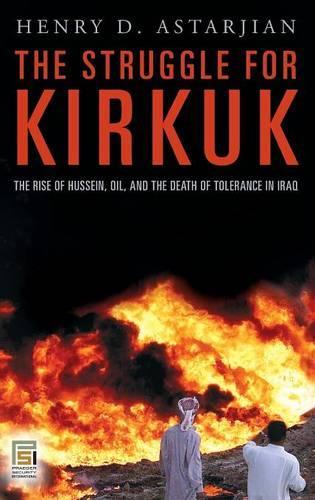
The Struggle for Kirkuk: The Rise of Hussein, Oil, and the Death of Tolerance in Iraq
(Hardback)
Publishing Details
The Struggle for Kirkuk: The Rise of Hussein, Oil, and the Death of Tolerance in Iraq
By (Author) Henry D. Astarjian M.D.
Bloomsbury Publishing PLC
Praeger Publishers Inc
30th May 2007
United States
Classifications
General
Non Fiction
956.7
Physical Properties
Hardback
200
Width 156mm, Height 235mm
454g
Description
Seldom in history has a nation engaged in war without knowing the enemy, as the United States has in Iraq. This book explores, through real life stories, the social and political dynamics at play in Iraq and Iraqi Kurdistan before the rise of Saddam Hussein. Kirkuk is a hotly contested oil citya time bomb with the potential to shatter the fragile hope for unity in Iraq. In this book-half memoir, half historyIraqi-American physician Henry Astarjian reveals the turmoil of life under Communism then as a political prisoner in a death row cell in Iraq and a military prison in Baghdad. Told from an eyewitness perspective, his book gives the history of Iraq through the life of one of its most volatile towns, through the eyes of a citizen who witnessed death, kidnapping, corruption, political indoctrination, and open murder in the streets. Originally a Jewish enclave, Kirkuk was home to Jews, Kurds, Armenians, Turks, and Communistsdiverse peoples whose uncommon experiences contributed to the broader political tensions of the 1958 Revolution that brought Saddam Hussein to power. This book is the story of the demographic diversity of this city, its political currents leading to the demise of the Royal regime of Iraq. It is the story of colonial Britains, Kurds, Turkomans, Assyrians, pre-emigration Jews, and post-genocidal Armenians, all living together in peace but with deep-seated animosities. Directly or indirectly they all were involved in surreptitious battles for control over Baba Gurgur, the oil fields of Kirkuk. Henry Astarjian was both a witness to and a victim of most events of this period. The book also explores the influences that the British, through the Iraq Petroleum Company (IPC), had in shaping Iraqi society. This book goes beyond the obvious in detailing the Soviet attempts to gain access to Baba Gurgur through its surrogates, the Communists, and their efforts to recruit the budding youth. It also tells the story of the author's incarceration and torture in a death row cell, at the hands of his childhood friend Adnaan Al-Azzawi, an avowed Communist. The demise of the Hashimite Dynasty in Iraq in 1958, which led to Communist takeover of the country, touched Astarjian's life personally. His incarceration with the Ba'th leaders in Al-Rasheed Military Base, gave him a special look at their psyche and a negative sense for the future of Iraq; that, influenced his decision to leave the country. Finally, the book pursues the psychological effects the Iraqi defeat in Palestine (1948) had on the Iraqi person and the Armed forces. It details the on-the-spot formation of the Iraqi Free Officers movement (whose founders later became the author's prison mates) who, a decade later, waged a coup against the Hashimite regime.
Reviews
Among the plethora of recent books on Iraq, this is unique because it offers a provocative view into Iraq's tumultuous past through the eyes of an Iraqi American physician. This is a historical memoir about the struggle over Kirkuk's great oil fields and the crises besetting Iraqi society before the Baath party takeover and rise of Saddam Hussein. Astarjian, the son of Armenian genocide survivors, chronicles Kirkuk's ethnosectarian diversity as Jews, Kurds, Turkmen, Assyrians, Armenians, and Arabs lived together in peace, despite the power plays over the oil fields involving British officials, Soviet agents, and others representing national or ethnic interests. Included are fascinating accounts of the overthrow of the Royal Hashemite regime in 1958, the author's incarceration and torture at the hands of his childhood friend (who had become a communist), and his imprisonment in a Baghdad military prison with Baath party leaders.[t]his is a compelling story about the formative years of modern Iraq, intended to enlighten Americans about the immense challenges and perils facing them in a tragic land. Sadly, it may be too late to make it a must read for US policy makers. Recommended. General readers, lower-division undergraduates through practitioners. * Choice *
Iraqi-American Astarjian combines memoir with history in describing the oil politics of Kirkuk in Northern Iraq from the 1940s through to the mid 1960s, when he left for America shortly after Saddam Hussein's assassination attempt on Prime Minister Abd-al-Karim Qasim. His description of the political life of Kirkuk during this era gives a small window into the complex forces at work Kurdish versus Arab, Arab versus Turkomen, Communist versus Baathist, etc. and Astarjian is not shy about letting his own anti-communist, anti-Baathist, and other views out into the open. * Reference & Research Book News *
Author Bio
Henry D. Astarjian is a neurologist who grew up in Iraq. He has lived in the United States since 1966. He attended the Royal College of Medicine in Baghdad and was in the Iraqi Army during the 1950s. He is the author of several articles on Iraqi Kurds and Armenian issues. He is the only witness to the assassination attempt by Saddam Hussein on Iraq's Sole Leader Abdul-Kareem Qasim, organized by the Ba'th Party.
